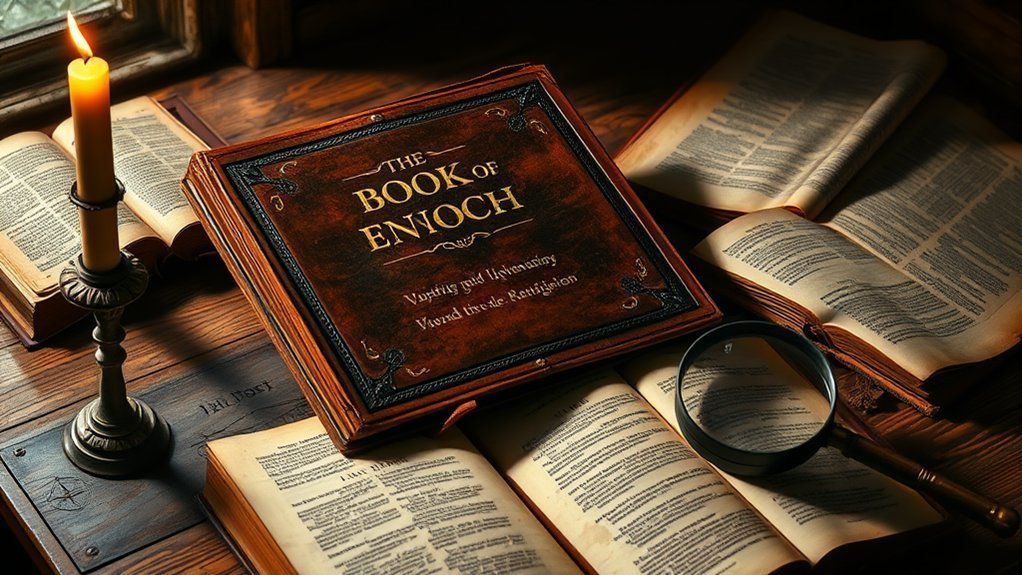Why Stay Away From the Book of Enoch
I believe it's wise to stay away from the Book of Enoch because it lacks canonical status and contains teachings that diverge from established biblical doctrine. Its claims of authorship are questionable, likely involving multiple authors over time. This text introduces confusion with false teachings about celestial beings and ignores the authority of Scripture. Engaging with such non-canonical books can mislead you spiritually, raising theological discrepancies that challenge core biblical beliefs. There's much more to explore on this topic.
Key Takeaways
- The Book of Enoch is non-canonical, lacking divine inspiration recognized by Jewish and Christian traditions.
- It contains teachings that diverge from established biblical doctrine, introducing confusion about celestial beings.
- The authorship is questionable, likely involving multiple writers over centuries, undermining its reliability.
- Its apocalyptic prophecies do not align with genuine biblical prophecy, leading to potential misinterpretation.
- Engaging with non-canonical texts can distract from the sufficiency of Scripture in spiritual beliefs and practices.
The Book of Enoch Is Not Canonical Scripture
Although many may find the Book of Enoch intriguing, it's vital to recognize that it isn't considered canonical scripture within both Jewish and Christian traditions.
This non-canonical status stems from its exclusion in the Jewish Tanakh and the Christian biblical canon. Early church fathers and councils, including the Council of Nicaea, didn't affirm it as inspired scripture, which emphasizes its lack of divine inspiration.
The New Testament also avoids referencing the Book of Enoch, leading to confusion among those seeking spiritual guidance.
The New Testament's silence on the Book of Enoch may perplex those in search of spiritual direction.
It's important to focus on texts recognized by tradition for their authoritative and divinely inspired messages.
The Book of Enoch Contains False Teachings

While many are drawn to the mystical allure of the Book of Enoch, it's crucial to understand that it contains teachings that diverge markedly from established biblical doctrine.
This text promotes false teachings, introducing a complex hierarchy of celestial beings that contradicts biblical teachings about angels as God's straightforward messengers.
Its intertwining of astrology and occult practices with cosmic events diverts our focus from divine authority.
Additionally, Enoch's apocalyptic prophecies lack the validation found in canonical Scripture, leading to confusion around angelology and the nature of angels.
Ultimately, these elements can mislead believers seeking truth and clarity.
The Book of Enoch Makes False Claims About Itself

The Book of Enoch makes several bold claims about its own authorship and authority that warrant careful scrutiny.
While it asserts to be penned by the biblical figure Enoch, scholars reveal that it likely has multiple authors over centuries, undermining its reliability.
The significant time gap between Enoch's life and the book's composition raises further doubts.
Additionally, its prophecies fail to align with genuine biblical prophecy, lacking the divine inspiration found in canonical Scripture.
Importantly, early church fathers excluded it from the canon, highlighting the false claims of authority that the Book of Enoch proclaims, questioning its authenticity entirely.
Reliance on the Book of Enoch Can Lead People Astray

Relying on the Book of Enoch can greatly mislead individuals seeking spiritual truth, as it often presents a narrative that diverges from established biblical doctrine.
This non-canonical text introduces confusion and can lead followers to adopt unbiblical practices that stray from core tenets of faith. The theological discrepancies within its pages challenge biblical teachings about angels and God's message.
By elevating it to a status equal to the inspired Word, we risk undermining the sufficiency of God's Word, as affirmed in 2 Timothy 3:16.
Ultimately, such reliance diverts focus from salvation through Jesus Christ and the essential truths of Scripture.
Exercise Caution With Non-Canonical Books

Engaging with non-canonical books like the Book of Enoch can be tempting, but it's important to approach these texts with caution. Their reliability is questionable since they lack the divine inspiration affirmed by the early church, such as the Council of Nicaea, which excluded them from the canon of Scripture.
The authorship of Enoch is dubious, likely involving multiple writers across centuries. Additionally, the theological content often contradicts biblical doctrine, particularly regarding sin and angelology, which can lead to confusion.
To maintain clarity in faith, we should exercise caution and prioritize the sufficiency of Scripture in our beliefs and practices.
Frequently Asked Questions
Why Is the Book of Enoch Forbidden?
I believe the Book of Enoch faces scrutiny due to questions about Enoch's authenticity, lack of divine inspiration, and its theological implications, which challenge established religious authority and risk spiritual deception within the broader apocryphal literature.
Why Shouldn't We Read the Book of Enoch?
Imagine wandering through an ancient library, but I find apocryphal texts like the Book of Enoch can lead to confusion. Its angelic beings and moral teachings challenge my faith, diverting from the biblical canon's divine authority.
What Did Jesus Say About the Book of Enoch?
In exploring Jesus' teachings, I find Enoch's significance lacking within the Biblical canon. Early Christianity emphasized the authority of scripture, aligning faith interpretations with historical context, while apocryphal texts like Enoch invite cautious spiritual discernment.
What Are the 14 Books Removed From the Bible?
The 14 removed books, including apocryphal texts, reflect early Christianity's struggles with Church history. Their absence from the Biblical canon fuels ongoing religious debates, highlighting their historical significance and diverse faith perspectives on theological implications and spiritual guidance.
Conclusion
In traversing the vast ocean of religious texts, it's wise to steer clear of the Book of Enoch, which, though enticing, can lead one into turbulent waters. Its lack of canonical status and questionable teachings may obscure the light of truth. By exercising discernment and anchoring ourselves in established scripture, we safeguard our faith from the sirens of misleading doctrine. Let's cherish the clarity of recognized texts and avoid drifting into the fog of uncertainty.







